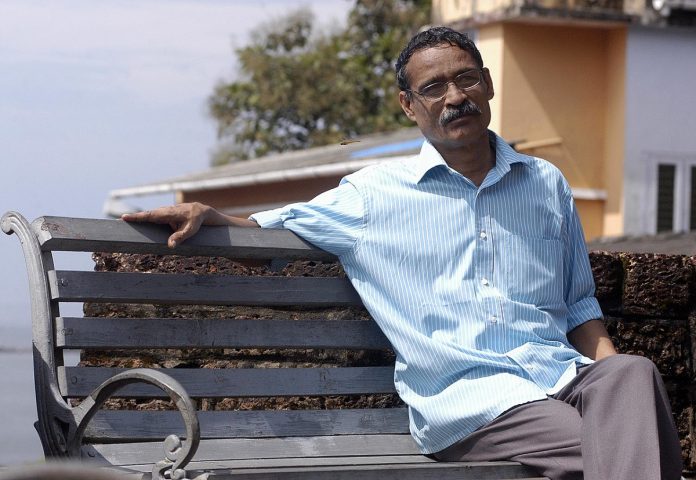Malayalam Poetry in Translation – 2
Translated by Aditya Shankar
(Translator’s Note: The finest of contemporary Malayalam poetry represents the latest poetic sensibility that is on view today. A poem that is able to mend its language and meaning, and blend into the issues of our time will break the barriers of language eventually. In fact, as a translator, I believe it becomes the need of other languages to grow and adapt to the new shapes of meaning that a poem carves for itself. My project ‘Malayalam Poetry in Translation’ is an attempt to showcase the work of some of the finest poets writing in Malayalam. I believe it is only apt to clarify in this note that new poetic sensibility is in no way co-related to the age of a poet, but is a product of her/his poetic outlook and awareness. Also, the scope of this translation series is limited to a sample size and do not encompass the entire spectrum of contemporary Malayalam poetry. Every notable poet manages to continually reinvent his poetic landscape and the poets featured in this series are no exception.)
The Bird without a Nest
Have seen the bird without a nest before
alongside the vanishing grazing herd
during a childhood that scaled the valley and mountain
at the slope of a hill where the sky descends
beneath the bush where desire writhes
in the shade of a mangrove daydream and so on,
have often spotted the bird without a nest.
Poor thing, it seems
the bird doesn’t know how to build a nest.
Regardless of how the nest is made, it falls apart.
Quail, Hen, Duck..
over time, my world of birds shrunk to
those commercially farmed for sale
those slaughtered for meat
those fried and eaten.
All the other birds folded their wings into oblivion.
Recently the bird without a nest appeared in my recall
with its frail body, feeble eyes, and glittery wings
and gave the feeling that it had vanished from sight.
Flying in pursuit of that feeling,
I discovered the pleasure of wings,
was fired from the post of royal treasurer, and
realized that no God can be the nest for the homeless.
(Translation of ‘Koodillatha Pakshi’, Page 22, Njan Theruvilekk Nokki, DC Books)
Mongoose Hair
Fourteen men gang raped and killed a fourteen year old.
Nineteen year old was involved in a scam worth nineteen crores.
Within three minutes, three explosions on the street.
All occurrences, as customary.
A son weeps in the hospital veranda
for lack of funds to secure his mother’s corpse.
The one who met with an accident
lies unattended on the road, bleeds to death.
The old rural lady engaged in flesh trade in the city
is strangled to death by an unsatisfied sex fiend.
All occurrences repeat themselves.
A sizable gathering is at the airport
to see off the leader on an overseas trip
to purchase fake currency printing machinery.
I wormed my way through the crowd,
shook hands with him.
I remembered kunjettan during the return trip,
the old communist who committed suicide last night.
It seems there isn’t any reason for the act, apart from boredom.
There is public anger on setting a bad example for youngsters.
As his wife and children stepped out for community activities,
men appointed for wages
received those who came home to offer condolences.
As I was in a hurry, I shed just two teardrops, handed over
a note with my contact details to the attendant and left.
Right now,
I am hunting for a mongoose hair in my plot.
I love this task because
primarily, it is not performed for a purpose.
Secondly, it then becomes an aesthetic act.
Thirdly and fourthly, I don’t give a damn if I can’t find it.
(Translation of ‘Keeri Romam’, Page 11, Njan Theruvilekk Nokki, DC Books)
About the author:
N. Prabhakaran is a noted fiction writer, poet, playwright, essayist, educationist, editor and columnist in Malayalam. He is a retired professor of Malayalam. He is an advocate of the latest trends in Malayalam poetry. His poems behave like natural objects. Precision and ingenuity are innate charms in his literary writings.
About the translator:

Aditya Shankar is a Pushcart Prize and Best of the Net nominated poet, flash fiction author, and translator. He edited Tiny Judges Shall Arrive (AHRC, Hong Kong), a selection of KG Sankara Pillai’s poems translated into English. His translations have appeared in the SAARC anthology of poetry, Muse & Murmur, Modern Poetry in Translation, Ethics in Action and elsewhere. His poems have been translated into Malayalam and Arabic and published from 20 or more nations. His poetry collections include After Seeing (2006), Party Poopers (2014), and XXL (Dhauli Books, 2018). His short films have participated in International Film Festivals. He lives in Bangalore, India . (https://adityashankar.ucraft.net/).
















